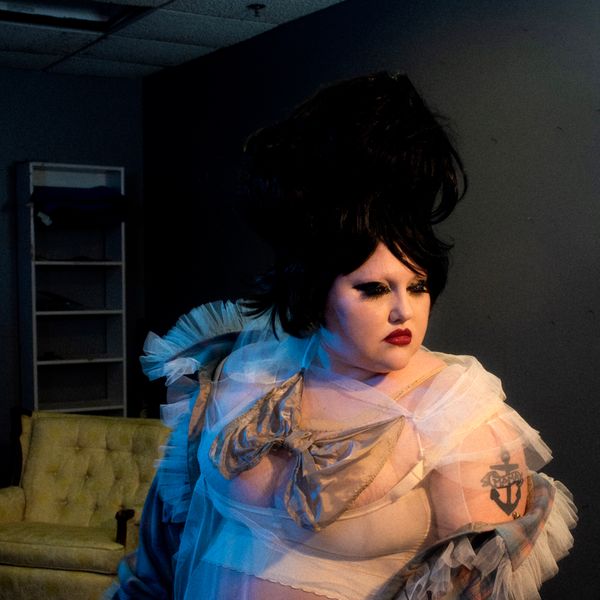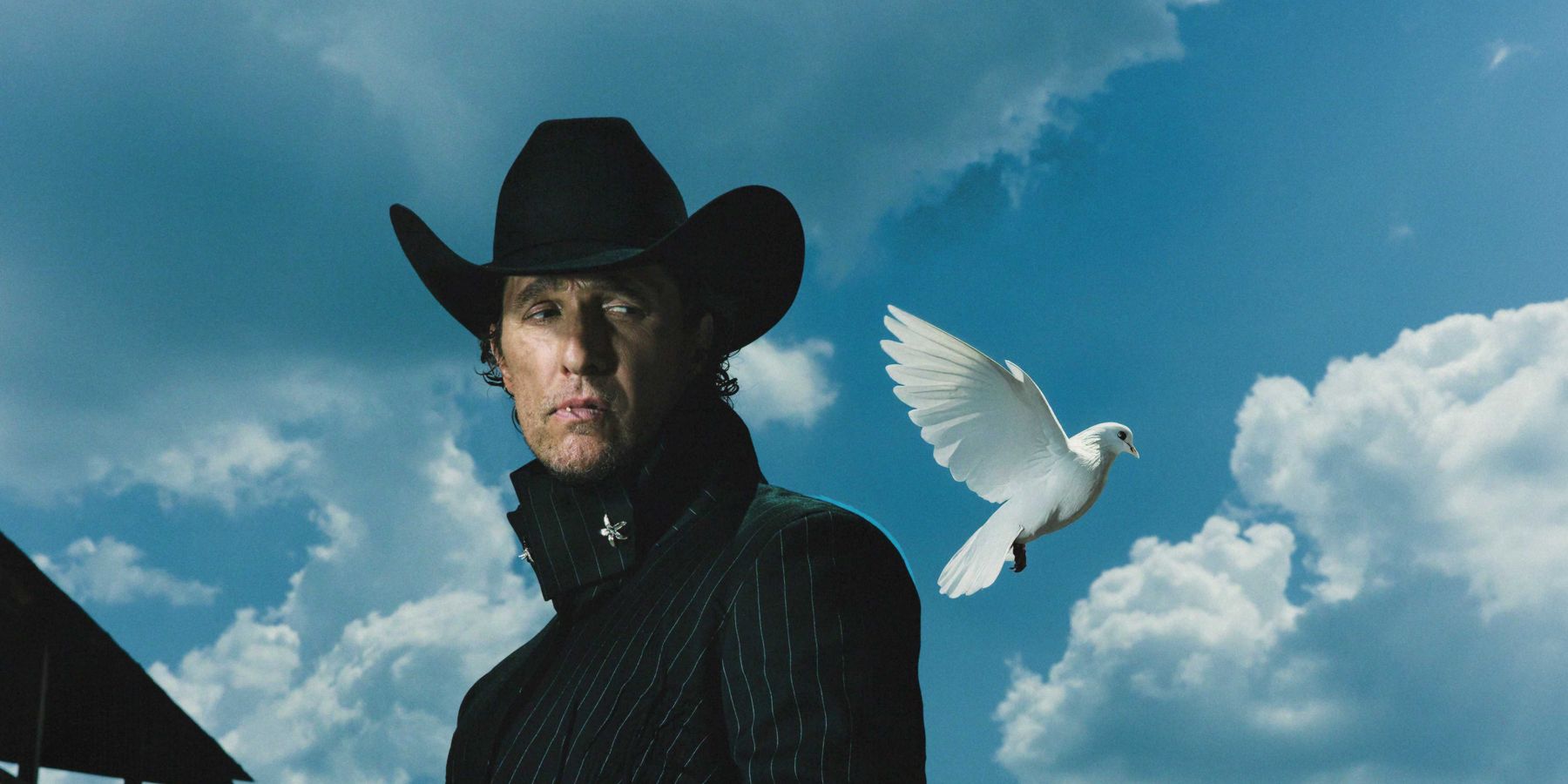
Gossip's Beth Ditto Is More Than Just Talk
Apr 09, 2024
Beth Ditto is a talker, but it takes one to know one. The frontwoman of the titular indie rock/pop group Gossip is sitting on the bed of her Lower East Side hotel room, surrounded by makeup she’s not yet put on, up against a pillow that’s stained orange from her fiery hair. Before we chat about Real Power, the band’s first album in more than a decade, we dig into recent events. Ditto has just changed hotels after another downtown establishment felt more like a hostel than a place to rest. Gossip’s drummer, Hannah Blilie, has been "sick as a dog," Ditto tells me with a steady Southern drawl. "Everybody's just tired, you know? We just got off this crazy trip, and then we go in and there's nobody there and we’re supposed to check in on an iPad?"
She offers me coffee, stepping over a suitcase of colorful clothing and passing a table where an uncorked bottle of welcome champagne sits on a small table. To our left is large window framing the New York City skyline. The whole situation could read very rock-and-roll, but as Ditto offers advice to remedy my cough and smiles after realizing I, too, am from the South, the space takes on the air of a friend’s living room — a place to talk shit while sipping slowly from a coffee mug, a comfortable backdrop to reminisce and look forward.
But don’t let the Southern comfort fool you. Gossip’s Rick Rubin-produced sixth studio album has all the disorienting, raucous sound and rowdy lyricism the band has been known for since their beginning. "It's been 25 years since the first Gossip tour ever," Ditto remembers. "I was 19 years ago. You'd print Mapquest from the internet and put it into a big book and then you'd have a tour manager or your booking agent put together all your instructions and the people you needed to call. We didn’t have cell phones. You solely relied on friend connection. We were kids. If my mother had known we didn’t have a place to stay until we showed up..." her thoughts trail off as she glances towards the towering New York City landmark on the other side of the window. "I mean, God, there's the Empire State Building," she says. "I remember the first time I came I asked someone to take 10 Polaroids of me outside the Empire State Building, because I didn't think we’d ever see it again."

On the topic of seeing things again, I remind Ditto of her two PAPER cover stories. A 2017 Pride issue that saw her in blush pink, eyes framed by dark black ‘60s-style lashes. We (rightfully) referred to her as a "feminist rock goddess, body-positive fashion icon" at the time and talked to her about what we thought would be a permanent decision to go solo. There’s also the 2010 cover of PAPER's Beautiful People issue, where Ditto is dressed like Pebbles of The Flintstones, her lipstick painted on to purse her lips, wearing a neon green print boa and a shorter cut to her tangerine hair. "Ya’ll are really good to me," she smiles. Ditto's knack for detailed storytelling with dashes of self-deprecating humor have followed her (along with her accent) from Arkansas to the band’s current home base of Portland and to venues and hotels across the world. Our conversation easily segues into talk of star signs, Ditto’s best friend (who is along for the press tour with her daughter) and room service over restaurants. Ditto grins as we run off-course, acknowledging it’s to be expected "because we’re talkers."
As we make our way back to our album discussion, she shares that she wanted the recording process for Real Power to be "simple." While recording the band's last album, 2012's A Joyful Noise, she’d learned a lot about herself, realizing just how much she was bringing to the band.
"I have value beyond just being a talker in this group," she says. "Every word that was ever written, every song that was ever sung was by me. I knew that, but I didn’t know that," she explains. She started recording with Rubin in Malibu during the pandemic, then invited Gossip bassist Nathan Howdeshell to come and play. What could have evolved into another solo record became the band’s latest album. "There's such a loyalty," she says. "I feel like that's so important. More than anything, roots are so important. I didn't feel right [thinking] this is gonna be a solo record, and Nathan was there and it was the two of us working on it. This is a Gossip record. That was it."

Though the album’s title track has drummed up praise for sounding like early Gossip, Ditto points to another song as the one that pulled Real Power together. "For me, it was 'Peace and Quiet,'" she says, pointing to a slow, strumming, soulful track that climbs wistfully, showing off the delicate movements in Ditto’s voice. It starkly contrasts the glitchy, dance-floor funk antics of "Real Power."
"People say, ‘['Real Power'] sounds like ‘Standing in the Way of Control'' and I’m always like, 'no,'" she says. Released in 2006 at the height of what some now call the indie-sleaze era, "Standing in the Way of Control" was a massive hit, soundtracking the British teen drama Skins, reaching Gold status in the UK and forever becoming part of the electro-disco early-2000s canon.
"‘Standing in the Way of Control’ was such a different song [than ‘Real Power’]," she says. "It was an emotional, visceral reaction to what was happening with my friends. [‘Real Power’] is an upbeat, not-emotional song." For Ditto, "Standing in the Way of Control" was more than a protest song. Although it was written in response to the Federal Marriage Amendment that would have outlawed same-sex marriage in the US, Ditto simply sees it as "a song to [her] friend."
"It was actually a song about a conversation that he and I had had," she says, adding that he was dealing with a family who was "horribly racist and terribly homophobic." "Now that I’m 43, the world is insane and there’s so much fear," she says. "But that song was different, because it was the first time we realized we weren’t children anymore, and the world is a lot scarier than we thought."

According to Ditto, there's "vulnerability in becoming a target in mainstream topics." It's something, she says, "marginalized people already fucking know."
"Your existence is constantly being debated, it’s being debated on the news and being debated in schools," she says. "I’m a cis white woman who people would never think was gay anyway, and that is a protection and privilege of its own. But I’m talking about my friends or even having a womb. All of a sudden, you are a hot topic and you become more visible. You become more targeted." For Gossip and for Ditto, even if they decide to write a song that’s just meant to make their fans dance, the fact that they’re the ones playing it makes it inherently political. Real Power may not be a protest album, but it’s still a Gossip album.
"One of my favorite examples of that is always George Michael," she says. "Just in the queer context, there are so many songs you grew up with and didn't know how political they were. I always think about when you’re a kid and you were listening to George Michael’s 'Father Figure.' It was so beautiful and it was a love song. But, when you pause it, you're like, ‘Oh, this means something completely different.’ Sometimes a song by people who are struggling in any way or just a song about joy is important," she adds. "We deserve love. We deserve fun and joy. Living in fear is traumatic enough."

Photography: Cody Critcheloe
From Your Site Articles
Related Articles Around the Web
MORE ON PAPER
ICONOS: Pepe Aguilar, El Oficio del Tiempo, la Voz del Silencio y el Peso del Legado
Español
Jan 19, 2026
Entertainment
Cynthia Erivo in Full Bloom
Photography by David LaChapelle / Story by Joan Summers / Styling by Jason Bolden / Makeup by Joanna Simkim / Nails by Shea Osei
Photography by David LaChapelle / Story by Joan Summers / Styling by Jason Bolden / Makeup by Joanna Simkim / Nails by Shea Osei
01 December
Entertainment
Rami Malek Is Certifiably Unserious
Story by Joan Summers / Photography by Adam Powell
Story by Joan Summers / Photography by Adam Powell
14 November
Music
Janelle Monáe, HalloQueen
Story by Ivan Guzman / Photography by Pol Kurucz/ Styling by Alexandra Mandelkorn/ Hair by Nikki Nelms/ Makeup by Sasha Glasser/ Nails by Juan Alvear/ Set design by Krystall Schott
Story by Ivan Guzman / Photography by Pol Kurucz/ Styling by Alexandra Mandelkorn/ Hair by Nikki Nelms/ Makeup by Sasha Glasser/ Nails by Juan Alvear/ Set design by Krystall Schott
27 October
Music
You Don’t Move Cardi B
Story by Erica Campbell / Photography by Jora Frantzis / Styling by Kollin Carter/ Hair by Tokyo Stylez/ Makeup by Erika LaPearl/ Nails by Coca Nguyen/ Set design by Allegra Peyton
Story by Erica Campbell / Photography by Jora Frantzis / Styling by Kollin Carter/ Hair by Tokyo Stylez/ Makeup by Erika LaPearl/ Nails by Coca Nguyen/ Set design by Allegra Peyton
14 October
Entertainment
Matthew McConaughey Found His Rhythm
Story by Joan Summers / Photography by Greg Swales / Styling by Angelina Cantu / Grooming by Kara Yoshimoto Bua
Story by Joan Summers / Photography by Greg Swales / Styling by Angelina Cantu / Grooming by Kara Yoshimoto Bua
30 September




